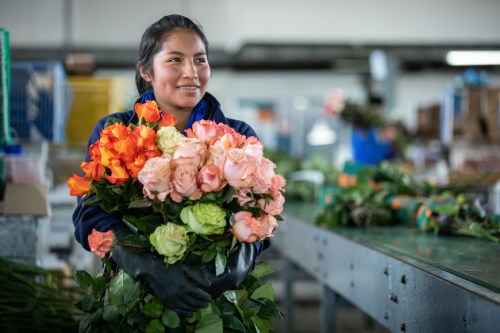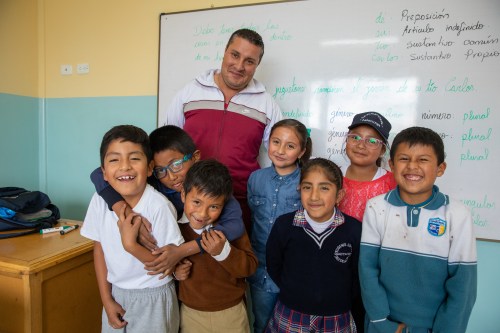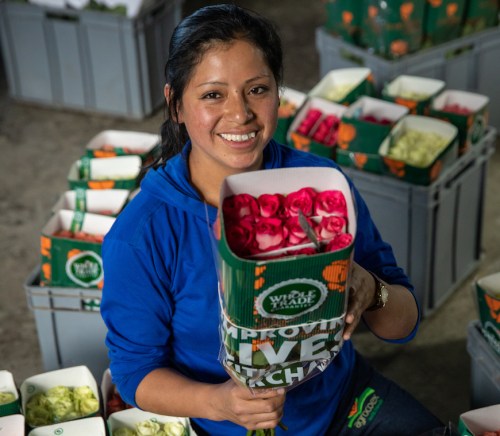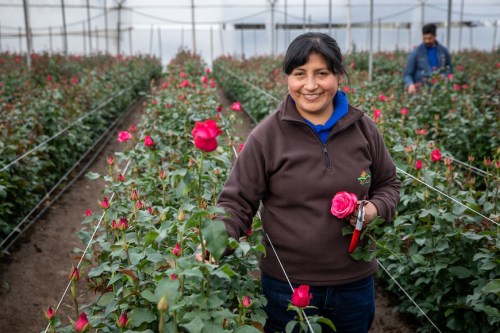As someone with at least a casual interest in wellness, there are likely a few questions you ask yourself when perusing the grocery store aisles. Checking the label to see if something is organic, where it’s sourced from, and if the packaging is sustainable have (thankfully) become more common when it comes to buying food, skin-care, and cleaning products.
But there’s one section of the grocery store that’s so far escaped the question game: flowers. I admit, even as someone whose job it is to write about wellness, I’ve rarely given much thought to flower sourcing. Typically, my eyes go straight to the prettiest bouquet, I debate if the price fits my budget, and if it does, I add them to my cart. I honestly never really gave much thought into where the flowers come from or who is picking them. So when Whole Foods invited me to find out first-hand and visit the rose farms in Ecuador where they source some of their flowers, I said yes.
As it turns out, just like with farm workers who source our food, not all flower workers are treated ethically or fairly. But the good news is there are certifications that clue conscious shoppers in on companies that do. Keep reading to learn about the different certifications to be aware of (no matter where you shop) and what these programs mean to flower workers.

What different flower sourcing certifications mean
Just like with food, there are certification programs in place that show if flower companies have met specific standards for ethical sourcing. These are the big ones to be aware of and what they mean:
FAIR TRADE CERTIFIED
A Fair Trade certification indicates that flower workers are paid fairly (meaning their earnings are enough for basic household needs, “regardless of volatile market prices”) and that a portion of the profits—called the Fair Trade Premium—goes directly back to the producers, farmers, and workers, who can use the money to make their community and lives better.
RAINFOREST ALLIANCE
A Rain Forest Alliance seal means the company has met specific standards that protect forests, mitigate the climate crisis, and promote the human rights of the farm workers.
WHOLE TRADE GUARANTEE
You can be on the lookout for the first two certifications no matter where you buy your flowers—including online—but this one is specific to Whole Foods. Whole Trade Guarantee is a program that works with certification programs (including Fair Trade and Rainforest Alliance) to support farmworker communities, improve the quality of life of farmers and protect the environment. One way they do this is by paying a community development premium that farm workers can decide how to use that will improve their lives and community. The premium is a cost Whole Foods works out directly with the suppliers; it doesn’t make the price more expensive for consumers.

How fair trade flowers programs impact the lives of everyday farmers
An estimated 250 million roses are produced every Valentine’s Day, with Ecuador being the biggest exporter and also the country of choice for Whole Foods. The farms they work with are located just south of the city of Quito, and the location has a few unique benefits that work in favor of flower farming. It’s zero latitude and 9,000 feet elevation, which provides perfect conditions for growing roses year-round. The region is also close in proximity to Cotopaxi, an active volcano. The volcanic soil is rich in nutrients, which also helps the roses grow. This lush, mountainous region is where I found myself in a quest to educate myself on flower sourcing.
Not all rose farms in Ecuador have a Fair Trade certification, but the two Whole Foods took me to, Agrocoex and Agrogana, do, which means it’s part of their mission to make sure their flower workers are treated fairly. “We became Fair Trade certified in 2002 because we wanted to create change in people’s lives,” Agrocoex owner Diego Espinosa says.
Agrocoex and Agrogana each harvest 70,000 roses a day; when they’re prepping for Valentine’s Day, their daily production jumps to 200,000. Meeting these demands is hard work, but many of the flower workers I spoke to expressed how much they liked their jobs. “I’ve been working here [at Agrocoex] for 27 years and the reason I’ve been here so long is because I have a good boss who really cares about the workers,” Rosio Foipe Ghuiopuidla told me through an interpreter.
In order for flower workers to benefit from the premium money, both the farms and whoever they are selling to (aka the retailer) have to be certified. This is because retailers pay the premium, not the customers. Both farms I visited have worker committees that are elected by all the flower workers. It’s the worker committees’ job to communicate to management what the workers want the premium money funds to go to—something they vote on monthly.
For example, at Agrocoex—where over half the workers are women—the committee communicated the need for childcare. Now, part of the premium money is used to give flower workers who are mothers a stipend for daycare. They also expressed the desire for a dental clinic on the farm. Now, workers can visit the dental clinic during the work day instead of taking a full day off work to meet an appointment. Plus, getting a cavity filled at the on-site clinic costs 40 cents, much lower than the typical price of $20, Espinosa estimates.
Workers at Agrogana used their premium money funds to build a childcare center and school for the farm workers’ children. “The schools here aren’t good, so a lot of times, students will fail out of college because they weren’t prepared,” one worker told me. “The school teaches kids English, math, computer classes, and also gives them a place to have fun and meet others their own age,” he said, adding that anyone in the community can also use the resources there, if they want to take educational classes, too.

Sometimes the funds are used for seemingly simple needs that make a massive difference in workers’ lives. At Agrocoex, workers in the past decided to use their premiums to build an on-site laundry facility. “I’m a single mom and my only day off is Sunday,” says Mayra Toapunta, a worker at Agrocoex. “Before, I would have to spend four hours every Sunday washing clothes in the river. This is how most women wash clothes in Ecuador as it’s very rare to have a washer. With the on-site laundry facility, now, we just drop off our laundry and someone does it for us while we work. Now, I get to spend Sundays relaxing and spending time with my son and mom.”
Other times, the premium money is used to make massive changes that take years to see through. In 2010, workers at Agrocoex voted to use their premium money was to build a community of well-built houses that workers can buy and own. (Many farm workers in Ecuador live in homes that don’t have a bathroom or running water.) After five years of construction, there’s now a community of 24 small, beautiful houses (for about 100 people) outside Quito, a location chosen by the workers so they could be close to the city. To move in, workers must have $5,000 of their own money saved, a 20 percent down-payment. (Some families with financial difficulties are given the option of 10 percent down.) Then, the house is truly theirs; even if they leave the company, they can still live there. Priority to move into the community is first given to single mothers and next to those in dire living conditions. Then, it comes down to how long someone has worked at the company.
The sad truth is, many farm owners care only about their bottom line and not what the lives of their workers are like. But as it’s been made abundantly clear in other industries such as food and beauty, voting with your dollar matters. If consumers support companies with ethical guidelines in place, it raises the bar. This is something I had honestly never thought about when it comes to flowers until I saw first-hand what the impact actually looks like.
When the collective acts of people buying ethically-sourced flowers comes together, it’s a beautiful thing—just like a bouquet itself. What better way to show some love this Valentine’s Day than making a purchase with a profound ripple effect? Now that’s flower power.
This is the secret to making your flowers last longer. Plus, why buying flowers is good for your wellbeing, according to science.
Sign Up for Our Daily Newsletter
Get all the latest in wellness, trends, food, fitness, beauty, and more delivered right to your inbox.
Got it, you've been added to our email list.











